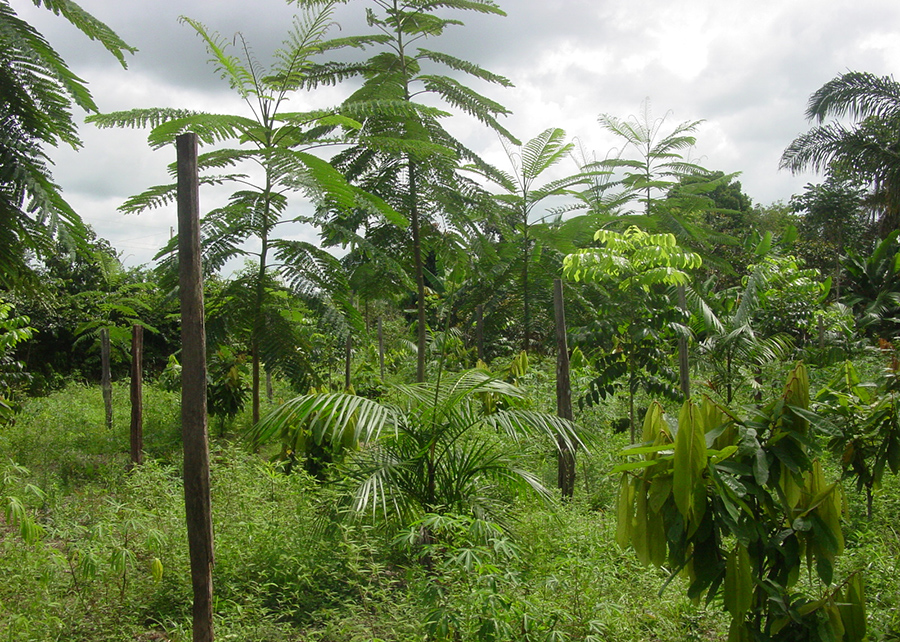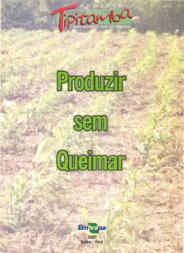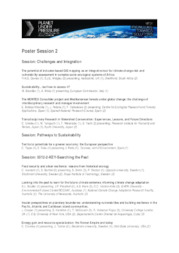ECLAC ranks Embrapa project among top transformative for sustainability
ECLAC ranks Embrapa project among top transformative for sustainability
Photo: Sabrina Gaspar

Agroforestry systems are one of the technologies included in the Tipitamba Project
|
A project developed by Embrapa in the Amazon region for nearly three decades was selected as one of those with highest potential to stimulate environmental sustainability in the country. Tipitamba, which aims to guide family farmers to adopt sustainable practices, is among the top 15 proposals selected by the Big Push for Sustainability in Brazil of the Economic Commission for Latin America and the Caribbean (ECLAC), a United Nations (UN) agency. Hence the work now comprises the publication “Transformative investments in sustainable development: Big Push for Sustainability in Brazil case studies” (available in Portuguese).
Tipitamba was born in 1991, with the aim of facilitating a sustainable future for family farmers in the Amazon region through the sustainable management of secondary forest growth, the thickets, as the area is prepared for plantation and fallow. The project was named after such vegetation. Tipitamba, in the language of the Tyrió Indigenous people, means secondary vegetation, which is precisely the areas that were traditionally slashed and burned for plantations, especially cassava crops.
In addition to being more sustainable, the technologies transferred to the family farmers proved more profitable than the previous methods, improving the quality of life of such populations. Tipitamba's activities involve technology transfer aimed at the recovery of modified areas, reduction in the use of agrochemicals, transition to agroecological production, agroforestry systems, diversification of agricultural production, food security and sovereignty, income improvement, mitigation of the environmental impacts, and knowledge-sharing among all the stakeholders involved.
29 years of participatory transformation
The project started when Embrapa Eastern Amazon signed a technical-scientific cooperation agreement with the German universities of Göttingen and Bonn in the scope of the program "Studies of Human Impact on Forest and Floodplains in the Tropics" (Shift). Throughout the years, Tipitamba became a network while keeping the goal of proposing technological, socioeconomic and environmentally sustainable alternatives for Amazonian family farming.
The Embrapa researcher Tatiana Sá, one of the project's idealizers, felt moved by the selection and considers that the recognitionwas due to Tipitamba's pioneering and continued trajectory. “Throughout the years, our multidisciplinary and interdisciplinary work has addressed topics associated with the different dimensions of sustainability, like training of personnel, at several levels, and the concern with formulation and application of public policy”, explains the scientist.
The scientific paper that allowed the experience in Pará state to be featured among the top 15 of ECLAC's Big Push for Sustainabily was entitled “Tipitamba Project - Transforming landscapes and sharing knowledge in the Amazon region”. “It sums up the evolution and transformation of the project,” recalls the researcher Osvaldo Kato.
“The lesson is that it is possible to experience such transformation, with work in the long run, by promoting action towards sustainable territorial development in small and mid-sized properties in the Amazon. Tipitamba is the proof of that the dream of sustainability is achievable”, Kato emphasizes.
The change responsible for the program's success, according to the scientist, is the appreciation of farmers' knowledge, which enables them to become agents of transformation. “From farmer to farmer, with the research working as mediator by systematizing processes and technologies, it is easier to have innovation reach farmers and be accepted by them”, ponders the researcher, stressing that farmer participation remains one of the strongest characteristics of the project.
Authors of the paperThe following participated in the elaboration of the paper about the project: Osvaldo Ryohei Kato, Anna Christina Roffé Borges, Célia Maria Calandrini de Azevedo, Débora Veiga Aragão, Grimoaldo Bandeira de Matos, Lucilda Maria Sousa de Matos, Maurício Kadooka Shimizu, Steel Silva Vasconcelos and Tatiana Deane de Abreu Sá. |
The selection
There were 131 experiences and projects enlisted. Out of those, 66 were shortlisted and included in the repository of cases on the Big Push for Sustainability in Brazil. In addition to appearing in the shortlist, the project developed by Embrapa was classified among the top 15 most transformative case studies.
According to ECLAC, in order to integrate the latter list, the projects needed to give evidence of the social, economic and environmental indicators reported, and be submitted to an analysis of the links in each case study with the Big Push for Sustainability and with the 2030 Agenda for Sustainable Development. The choice was for studies that present a fresh approach to help the countries in the region build more sustainable styles of development that area based on the coordination of policies to promote transformative investments. “By combining theory and practice, these cases illustrate the broad possibilities for sustainable investments in several sustainable practices and technologies (ranging from agroforestry systems to the development of the wind energy industry) and through a rich plurality of measures, policies, governance arrangements, sources of funding and scales of operation”, remarks ECLAC's official text.
Transformed lives and landscapes
Luciano Braga Rocha, a 38 year-old family farmer and agricultural technician, was still a boy when he used to follow his father Elias Pinto Braga's hard work in their small 25 hectare-large property, in the town of Igarapé-açu, Northeast of Pará. Every year, he saw his father knock down the thicket and burn it to plant cassava, beans and maize. A laborious work that not only exhausted the head of the family but also the land, which became less productive and green..
The change started to occur when in the mid-1990s researchers from Embrapa arrived in the region proposing a change in their traditional way of cultivation. At first, Rocha remembers that the family was suspicious and took long to accept the idea of “planting wood”, as they called the plantation of trees, and no longer burning the thickets to farm. Little by little and with a lot of talk, they stared changing and adapting their ways, combining the new technologies that were proposed by the researchers with the region's traditional lifestyle and cultivation.
The fire gave way to cutting and grinding the vegetation to clear areas for plantation. Seedlings of forest and fruit species that were already known and even common in the backyards around the farmhouses were lined up in the plot that once only received annual crops, that also remained there. Except that now the beans, maize and cassava started to be intercropped with a variety of species.
Nearly 30 years have gove by, the property turned into a model and showcase for the neighbors and today reaps a diversity of products ranging from fruits, vegetables, flours and grains to small animals. The farm turned green again, and improved the quality of life and income of the Rochas.
Fotos: Ronaldo Rosa
Translation: Mariana Medeiros
Kélem Cabral (MTb 1981/PA)
Embrapa Eastern Amazon
Press inquiries
amazonia-oriental.imprensa@embrapa.br
Further information on the topic
Citizen Attention Service (SAC)
www.embrapa.br/contact-us/sac/


